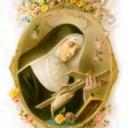Yahoo Answers is shutting down on May 4th, 2021 (Eastern Time) and beginning April 20th, 2021 (Eastern Time) the Yahoo Answers website will be in read-only mode. There will be no changes to other Yahoo properties or services, or your Yahoo account. You can find more information about the Yahoo Answers shutdown and how to download your data on this help page.
Trending News
How can Catholics call themselves Christians when they refuse to study the Bible literally?
Why do Catholics think it is ok to say things that are not in the Bible and read between the lines and generalize?
42 Answers
- lyn1136Lv 71 decade agoFavorite Answer
Do you mean as when Christ said
"Take ye and drink ye all of this, FOR THIS IS THE CHALICE OF MY BLOOD,
OF THE NEW AND EVERLASTING TESTAMENT, THE MYSTERY OF FAITH,
WHICH FOR YOU AND FOR MANY SHALL BE SHED, UNTO THE REMISSION OF SINS." ??
No problem. Just have pope Montini change it to
"Take ye and drink ye all of this, FOR THIS IS THE CHALICE OF MY BLOOD,
OF THE NEW AND EVERLASTING TESTAMENT, THE MYSTERY OF FAITH,
WHICH FOR YOU AND FOR ALL SHALL BE SHED, UNTO THE REMISSION OF SINS."
Viola! Now you don't have to worry.
Traditional Catholics at
traditionalmass.org/
- Sacra VeritasLv 71 decade ago
You sadly do not know what you are talking about. Catholics have revered always the Holy Bible. It is the Catholic Church that has truly defended the Bible. Three is a reason why you use an abbreviated version of the Bible - it wasn't because Catholics added any. Secondly, the Bible did not develop out of a vacuum. The New Testament sprang out of the the living and breathing Church, not the other way. It was the authority of the Church, given by Christ himself, that the Canon of both the Old and New Testaments were discerned in the first place. The problem with just reading the Bible literally and not in context of the whole of the Bible, Divine Revelation and good hermeneutics, is that it leads to chaos. This is why there are literally thousands of different interpretations of strictly literal interpretation. Besides, when Catholics literally interpret John 6, it's the Bible Only crowd that starts making things up.
- 5 years ago
This question always amuses the hell out of me. Until Henry VIII (Anglican) and Martin Luther (Lutheran, then some 30,000 other sects, and counting) came along, the Orthodox and Catholic churches WERE the Christians. There were no others. Catholics = Christians for 2000 years. Protestants = Christians for about 500 years. And the only difference between the Catholic (original) bible and the protestant bible(s) in their numerous translations is that Martin Luther threw out some of the books the catholics had determined to be the "Inspired Word of God" back in the Council of Nicea in the 4th century. All protestant bibles are derived from this original source. I'm not even going to touch the "what catholics do is not in the bible" one. The Trinity is not in the bible. "Original Sin" is not in the bible, that was invented by Augustine (a catholic theologian) in the 4th-5th century. The Rapture is not in the bible. The bible clearly states Jesus is the "son" of "god" in some places, it is claimed that the bible also says Jesus IS "god" in other places and the protestants are still fighting over that. This is not a defense of the catholics, by the way. I'm agnostic, I think all you guys are fighting over a lot of made-up stuff with no proof. BUT, if you are going to fight amongst yourselves, please at least try to get your historical facts straight and your dogmas correctly identified as to source. Otherwise, you just make yourselves look ridiculous. Blessings on your Journey!
- MistyLv 71 decade ago
There are several areas the Catholic Church takes literally, and some we don't . It depends on how it is meant.
The Bible is not one book, it is a library of books. Some sections are historical, some analogy and symbolism and some literal.
The Church does not "read between the lines and generalize" the Church uses the teachings of the Apostles not written (called Sacred Traditions) in conjunction with the Sacred written Word, to present the divine truth.
Read John 6 - here Jesus tells his followers that they must eat his body and drink his blood in order to have eternal life. Why is it non-Catholic Christians do no take this literally? Catholics do.
In Matthew 16 Jesus gave the keys of the kingdom of heaven to Peter, and called him "Rock", the institution of the Church. Why do non-Catholic Christians not take this literally?
The Bible says all things are not written down,and that Jesus did things only his Apostles saw...what of those things? Because they are not written they are not valid? Do you have a Bible verse to support such notion? The first century of the early Church had no New Testament. All those converted were converted by word of mouth...not scripture. What of them? The things they were taught did not come from scripture but from those who knew Christ or were disciples of his Apostles. Those things were valid, even when there was no Bible to reference.
Jesus never told anyone to write or to create a Bible.
We have the early Christian writings from the first few centuries...and their beliefs and practices are Catholic.
- How do you think about the answers? You can sign in to vote the answer.
- eltsLv 41 decade ago
Because the Catholic Church wrote the book in the first place, and chose which books would go in it, before your denomination even existed.
John 21:25 says that Jesus did a ton of other stuff, which wasn't written in the Bible.
Jesus built a church and appointed St. Peter to lead it. Peter and the apostles passed down SACRED ORAL TRADITION through the centuries, which the Catholic Church has adhered to, just as it adhered to the written word of God.
The Catholic Church knows better than you how to interpret the Bible, since they have 2000 years and a much better knowledge of history, linguistics, and traditional Hebrew culture than you could ever hope to have, so they have a fairly good idea of what is to be taken literally and what isn't. Are you reading an English Bible? You're already setting yourself up to lose, then.
Literal interpretation leads to a multitude of contradictions, e.g stone women vs don't stone women; be circumcised vs don't worry about being circumcised.
Literal interpretation also contradicts scientific evidence, which the Catholic Church chooses to embrace, not scorn. Literal interpretation means the earth is only several thousand years old, which is ridiculous. Literal interpretation also means that the concept of a 'day' existed even before the sun and moon existed. How do we measure 'days' again?
The Catholic Church thinks it is okay to read between the lines because that is the only way to truly understand the meanings in the Bible that arrogant fundamental Christians overlook.
The Catholic Church says things which may not be directly expressed in the Bible word-for-word, but are nevertheless expressed in some form. All seven sacraments can be found in the Bible, for example, although not always expressed directly.
Peace
@Pastor Art --- your argument is just wrong. The Apostles used the Septaguint in their teaching, but additional books such as the Epistles were written during the times of the Apostles themselves, and were not used as a basis for teaching. The Catholic Church officially compiled all 73 books, including the Septaguint and the Epistles, as the Sacred Scripture. They also abolished a number of books which were deemed heretical. So they did in fact compile the Bible. Your Bible does not contain all 73 books because you removed several, which came from the Septaguint. Instead you chose the revised Hebrew set of books, (which originally contained all the books of the Septaguint, but some were removed because of Hebrew nationalism). The Apostles may have been born Jewish but they were also Christian. And by being the original Christians (Catholics) it was indeed the Catholic Church that wrote the Epistles and other books not listed in the Septaguint. So unfortunately, Pastor Art, it is you who is wrong here.
Source(s): catholic - Anonymous1 decade ago
The basis for all the meanings of a verse in the Bible is the literal meaning. It is not the only meaning, it may not be the most important meaning. That Eve was created from Adams rib is not a clinical description. It means he comes from near his heart and near his side. She is not a limb to be worked nor an ornamental feature like hair. She is not from one of his eyes blinding him nor from his head dumbing him down.
To keep to the literal meaning alone is to lose much that is inspiring.
When a modern American writer describes a tense situation, he may liken it to a batter with full count facing the best pitcher in the league with bases loaded and the game tied. Even other modern English speakers would have trouble with the meaning.
So, too, expressions in the Bible are related to the culture of the people the stories were for. Shepard mean something to nomadic people that they don't mean to modern Americans; so, too, Kings or wise men from the Orient; so, too, people who live in cities.
This is reading between the lines and generalizing. No one verse in the Bible summarizes it all; no verse in the Bible should be given a meaning that contradicts the sense of the Bible as a whole.
As to saying things that are not in the Bible, Christians have always done this. There was a time with no Bible and the teaching of Jesus were what people were taught. Nothing the Church teaches from the Bible or from outside the Bible contradicts the teachings of Jesus.
Jesus went into the desert, fasted and had visions. Catholics have monks and nuns who separate themselves from society to pray. Catholics fast on Good Friday and Ash Wednesday; Fasting is a form of prayer. Catholics have visions, not all, and not all credible, but we do not think these people diabolical (unless they are); We only accept what was revealed in the first century, but we apply it to the times we have lived in, the second through twentyfirst century.
Know, too, that we see things in the Bible that other Christians don't. We take the instruction that marriage be indissoluble literally. We take the admonition to do the Eucharistic service literally. We do it daily around the world. The only day we don't is Good Friday.
We have a ministerial priesthood, not a cultic priesthood.
The protestant revolt declared the Bible the standard and used it to challenge the authority of the Church. No one had done this before and the Church disagreed. All the teachings of Jesus are the standard and the Church is the institution that preserves these truths and teaches what they mean for the current generation of Christians.
We were Christians that held all the teachings of Jesus before there came to be Christians who said that only the Bible contains the teachings of Jesus. Historically it is the Protestants who restrict themselves to the Bible teachings and not the Catholics who refuse to study the Bible as the sole source of the teachings of Jesus.
We reject a teaching that is only 500 years old and hold on to a practice that existed before the Bible was collected into a single binding.
- MayflowerLv 71 decade ago
It's a good thing you brought this up. for your cathecism 101:
Christianity was not founded on BIBLE ALONE. It is the Catholic Church that gather, edit, assemble and printed the 73 books called the Bible.
....The first “canon” was the Muratorian Canon, which was compiled in A.D. 170. The Muratorian Canon included all of the New Testament books except Hebrews, James, and 3 John.
In A.D. 363, the Council of Laodicea stated that only the Old Testament (along with the Apocrypha) and the 27 books of the New Testament were to be read in the churches.
The Council of Hippo (A.D. 393) and the Council of Carthage (A.D. 397) also affirmed the same 27 books as authoritative.
Finally the council of Trent of 1545 AD sanction the 73 books as the final authority and embodied in the Latin Vulgate Bible of the Catholic Church.
Other bible versions are wanna-bes and read as reference and with caution.
Source(s): http://www.gotquestions.org/canon-Bible.html - 1 decade ago
Saying that everything in the Bible is not literal is hardly heretical or erroneous. If every single verse were taken literally, there would be no question of the Real Presence of Christ in the Eucharist.
When you refer to "things that are not in the Bible", I can only guess that you are talking about Sacred Tradition. Before there was a written Bible, Christians had to rely on oral tradition. The Catholic Church holds that Sacred Scripture and Sacred Tradition combined make up the fullness of Divine Revelation.
If you have further questions, please feel free to email me.
God Bless and have a Merry Christmas!
- TophehLv 61 decade ago
Because biblical literalism only took off in the last 200 years, and before that people would have laughed at you for doing so? Because many other Christian groups (people always forget the orthodox, although we've gotta include protestant groups like the anglicans, too) agree with us that the bible is not, and cannot be, the sole source of divine teaching. Because we came first, and you changed the definition. Because, if we want to use the banal and democratic 'majority rules' method, we win. Catholics are over 50% of the world's Christians, so by that metric, whatever we would say makes a Christian... would be a Christian.
And finally, because we believe in and follow Christ Jesus.
- tebone0315Lv 71 decade ago
Did you know that you can attend a Catholic Mass 7 days a week, not just one day a week like Protestants. We study the complete bible(73books) and in 3 years have read the whole bible. We dont pick and choose what we read as the Protestant churches do. What does studying the bible literally mean? Protestants reject the majority of the literal teachings given to us by Jesus Christ.Such as the teaching on the Eucharist in John 6. The teaching of Peter being the first leader/pope of the church. There are many others that Protestants reject.
You do know that the Catholic Church wrote and compiled the bible in the 4th century dont you? No of course you dont. You think Jesus and the Apostles taught from the King James Version of the Bible.
Please stop bearing false witness againsy Jesus Christ and His Catholic Church.
Catholic Christian †
- 1 decade ago
Where in the Bible does it say to study it literally?
Catholics call themselves Christian because Catholics are the original Christians. That's just historical fact.






